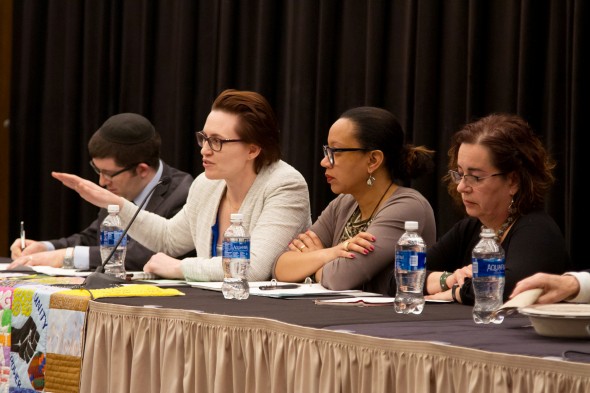Campus Conversation considers protected speech

A panel of scholars discussed the First Amendment and protected free speech during the April 6 Campus Conversation event. (Photo: Tim Goldrick)
Even on a diverse campus like UIC, free speech is a hot-button issue.
The heat was turned up last month when anti-Semitic posters were found around campus.
The April 6 Campus Conversation — part of a yearlong initiative sponsored by the Office of the Provost — centered on addressing the posters and discussing what constitutes protected free speech under the First Amendment. A follow-up open forum is scheduled for noon April 12 in the Thompson Rooms, Student Center West.
UIC student Amy Levine attended the event after hearing about the posters.
“[I came] to figure out how we can fix the problem,” she said.
To have a nuanced, spirited dialogue, UIC invited an experienced panel: Sheldon Nahmod, distinguished professor of law at Illinois Institute of Technology; Rabbi Seth Winberg of the Levine Hillel Center at UIC; Nadine Naber, director of UIC’s Arab American Cultural Center; Megan Carney, director of UIC’s Gender and Sexuality Center; Rosa Cabrera, director of the Rafael Cintrón Ortiz Latino Cultural Center; and Lori Barcliff Baptista, director of UIC’s African-American Cultural Center.
“The time is right, here at UIC, to engage in this discussion about these issues with the goal of respecting and encouraging the free and open exchange of ideas, while maintaining the diverse and inclusive community that UIC prides itself on,” said Provost and Vice Chancellor for Academic Affairs Susan Poser, who moderated the event. “And this is no small task.”
Nahmod, a well-known expert on constitutional law and civil rights, kicked off the event by detailing the background, phrasing and pitfalls of the First Amendment.
“Free speech has costs,” Nahmod said. “And like other constitutional rights, the First Amendment is not absolute. There is no such thing as an absolute constitutional right for individuals.”
With the historical foundation laid, Winberg localized the issue by confronting the anti-Semitic posters found on campus last month.
He pushed students to consider how they practice free speech.
“Posing the question whether a specific act of free speech is legal according to the laws of our country, strikes me as a low bar,” he said. “For my students at Hillel and for all of us here, I would encourage a more spiritual frame of reference. What speech helps build a society of respect and harmony?”
After the event, students talked about how the conversation was a solid beginning, but it should continue.
“It’s necessary to keep pushing this conversation around the First Amendment and what is free speech?,” said Ian Torres, a student in the crowd. “I think we should have an understanding of it at the government level, but also I want to see it brought to the university level.”
